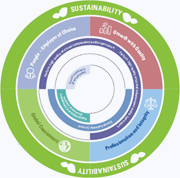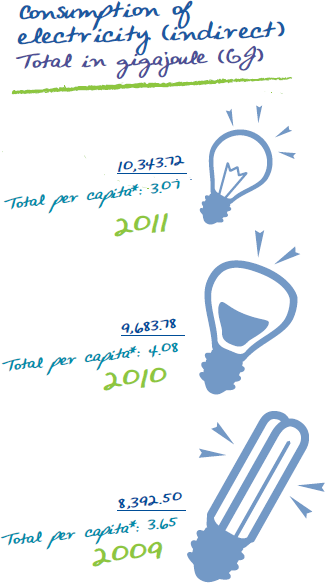People – Employer of Choice
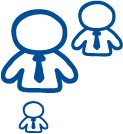 Human resource management
Human resource management
In defining the material themes for this report, amongst various issues assessed, our stakeholders stated that our business, given its nature, should always focus on ethical management, with transparent and responsible governance, capable of delivering high quality services based on the fair treatment of its employees.
The four themes prioritized, not by chance, constitute the fundamental strategic pillars of the KPMG International member firms.
Our people constitute one of our pillars and it is through them, that we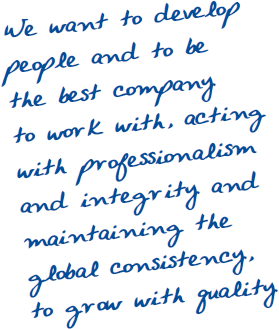 implement our vision and our strategy. It is our personnel that address the questions prioritized by our stakeholders, which create value for clients through solutions that help them develop competitive advantages, and offer greater transparency and credibility for their financial statements. Our practices assist the capital markets face its challenges, they can make public services more efficient, the financial market more solid, and develop governance in various segments, contributing to building a vibrant and more sustainable society
implement our vision and our strategy. It is our personnel that address the questions prioritized by our stakeholders, which create value for clients through solutions that help them develop competitive advantages, and offer greater transparency and credibility for their financial statements. Our practices assist the capital markets face its challenges, they can make public services more efficient, the financial market more solid, and develop governance in various segments, contributing to building a vibrant and more sustainable society
On this journey, our personnel will find challenging and innovative employment opportunities, and a solid career plan to develop their full potential. We constantly invest in our professionals so that we can grow together and have a crucial role in the business world.
We are committed to a high performance culture, and being an Organization that attracts important talents. Our personnel have global mindset and forward-thinking, they are passionate experts dedicated to the work they undertake to generate value for clients.
Attract, contract, develop, support, recognize and retain the best professionals is essential for enduring growth and to promote the succession process in our Organization. Consequently, we offer our team an environment that contributes towards personal and professional development, led by human resource management and by the Learning & Development area.
Recognition
KPMG International was awarded first place
amongst the Big Four and second place in the Business Segment, in the research undertaken by Universum that identified the most attractive companies to work for: The World’s Most Attractive Employer 2011. For more information: http://universumglobal.com/IDEAL-Employer-Rankings/Global-Top-50

Our team
GRI LA1
At September 2011, there were 4,073 people working for KPMG in Brazil. Of these, 3,830 are KPMG professionals, being 3,566 employed by the Organization, contracted based on the Consolidated Employment Law (CLT), 21 apprentices, and 243 partners and partners-directors. That number of people also includes 220 workers from contracted companies (outsourced), who do not have an employment relationship with KPMG – the majority for infrastructure support services – and 23 temporary workers.
People: term used to define all personnel who work at KPMG.
Professionals: specific term that includes partners and partner-directors, employees from KPMG’s technical and administrative areas, contracted according to CLT and also apprentices.
| Total KPMG People | |||||||||||||||
|---|---|---|---|---|---|---|---|---|---|---|---|---|---|---|---|
| Cidade/escritórios (unidade operacional importante) |
Permanent contract (CLT) | Temporary contract | Partners and partner-directors | Outsourced | Total | ||||||||||
| 2011 | 2010 | 2009 | 2011 | 2010 | 2009 | 2011 | 2010 | 2009 | 2011 | 2010 | 2009 | 2011 | 2010 | 2009 | |
| São Paulo | 1,780 | 1,404 | 1,251 | 8 | 13 | 6 | 153 | 143 | 137 | 187 | 153 | 66 | 2,128 | 1,713 | 1,460 |
| Rio de Janeiro | 509 | 400 | 354 | 6 | 5 | 4 | 30 | 24 | 22 | 15 | 10 | 9 | 560 | 439 | 389 |
| Demais localidades | 1,298 | 691 | 571 | 9 | 0 | 3 | 60 | 21 | 21 | 18 | 13 | 13 | 1,385 | 725 | 608 |
| Subtotal | 3,587 | 2,495 | 2,176 | 23 | 18 | 13 | 243 | 188 | 180 | 220 | 176 | 88 | 4,073 | 2,877 | 2,457 |
| Total KPMG professionals | 3,830 | 2,683 | 2,356 | ||||||||||||
64.5% of our professionals are concentrated within the São Paulo and Rio de Janeiro offices, consequently, we opted to present the indices divided between three categories: São Paulo Office, Rio de Janeiro Office and other offices. Only 1% of our own employees and temporary staff work for six hours a day. Since this is not significant data, we have removed it and developed a way to facilitate the visualization of this information.
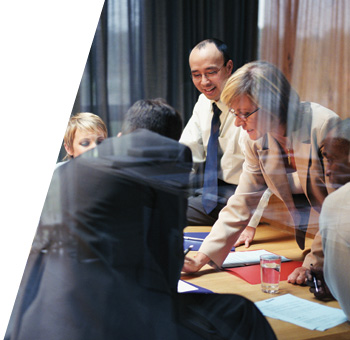
Distribution by office
KPMG professionals
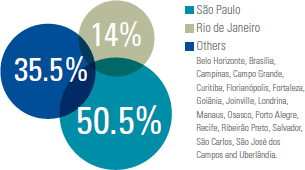
Total KPMG professionals by age
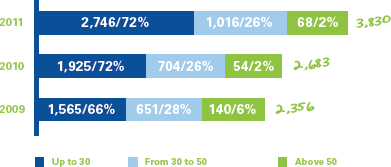
Total KPMG professionals by gender
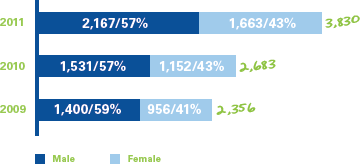
KPMG values and encourages maintaining an environment of respect for uniqueness, in which rich and innovative solutions can thrive. As a citizen Organization, we are responsible for encouraging diversity and inclusion. This commitment is declared in our value “we respect people for who they are”, and is reinforced in our Code of Conduct, which promotes an environment free of discrimination.
Our promotion and remuneration policy is based exclusively on merit – guaranteed by the performance assessment processes – and in accordance with the relevant laws, irrespective of personal characteristics such as race, color, religion, sex, nationality, disability, sexual orientation or civil status.
GlobeSmart: understanding global cultural diversity 
- How and when should I present my visiting card?
- Should I compliment someone with a hand-shake or a kiss on the cheek?
- Do I run the risk of offending someone if I call them by their first name?
This KPMG tool offers simple and interactive replies on how to undertake business in different countries, through cultural profiles and comparisons between habits. For more information, access: www.globesmart.com.
KPMG Professionals – Administrative Team
(by gender and by age)
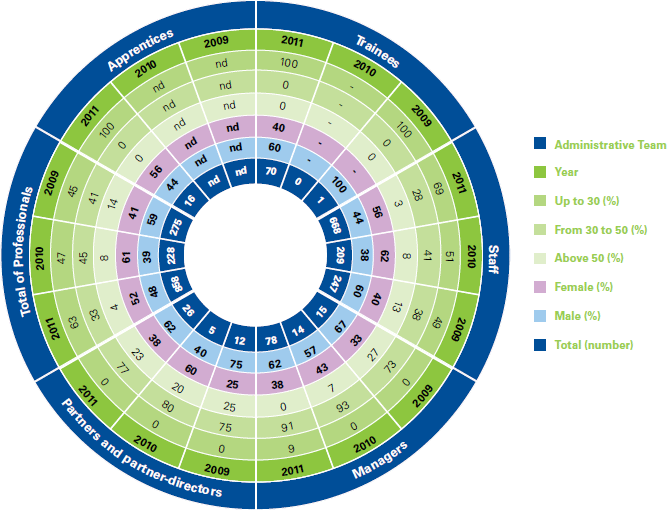
We have improved the data collected in 2011, including the category “Apprentice”. In previous years, the Apprentices were included to the category staff.
Obs.: The purpose of dividing our professionals between “technical team” and “administrative team” is to provide clear information on the number of professionals directly related to our core business (technical team).
KPMG Professionals
– Technical team
(by gender and by age)
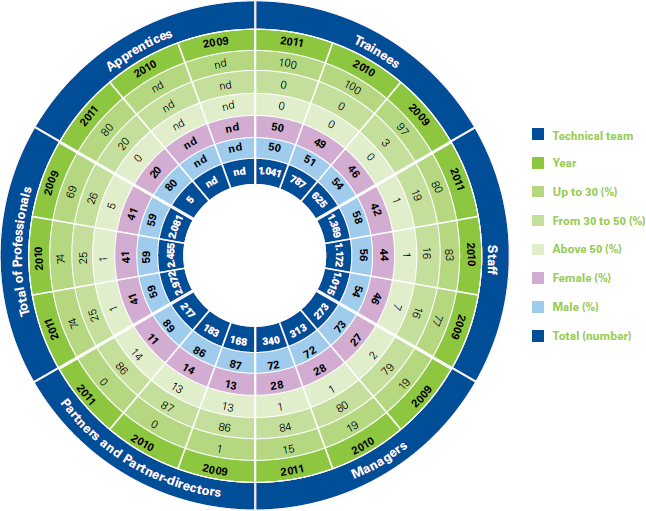
We have improved the data collected in 2011, including the category “Apprentice”. In previous years, the Apprentices were included to the category staff.
Obs.: The purpose of dividing our professionals between “technical team” and “administrative team” is to provide clear information on the number of professionals directly related to our core business (technical team).
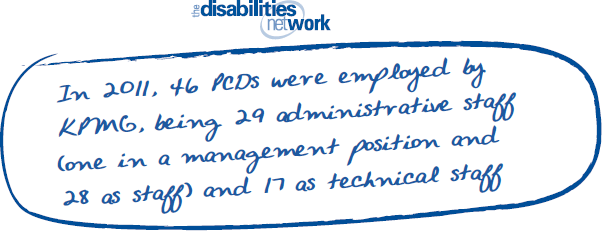
The Inklusão Group, provides continuity to our program to encourage diversity. One of our challenges has been contracting individuals with disabilities (PCDs). There is a clear difficulty on the Brazilian market in relation to qualified labor, and this is an even more sensitive issue when we talk about PCDs, either because of structure, conjectural or cultural questions in Brazil. Consequently, the majority of the individuals contracted have been in the administrative area. As part of the process for preparing and offering opportunities to these individuals, we started the first personalized trainee program for individuals with disabilities (PCD). Our selection and recruitment process was adapted to meet the special needs of each candidate and we contracted nine trainees. In addition, for 2011, we anticipated a pilot program to train these individuals. Difficulties in the design and operating of the program has alerted us to the need for a partnership with the Employee Support Center (CAT –São Paulo Local Authority) to adjust the training program and the availability of vacancies, which resulted in postponing the pilot program to 2012, with the goal to prepare and contract 12 professionals. To assist in the integration of PCDs, we launched the coexistence manual for the internal public, highlighting appropriate ways to behave. We launched information on intranet, through institutional videos and internal magazines. Our infrastructure area has made all of the adaptations necessary to meet accessibility criteria, working to ensure that professionals who have some form of limitation are not impaired in their work (for example: voice software for visual impairments). |
Composition of the Inklusão GroupMarcela Navarro (RH)Monique Leme (RH) Tatiana Gouveia (RH) Adélia Belo (L&D) Braulio Fernandes (KC) Lucimara Vieira (Programação) Keli Castro (Marketing) Eliete Ribeiro (Tax) Eliane Momesso (Cidadania Corporativa) Patrícia Molino (P&T) Renata Greb (Audit – RM) Roberto Coelho (IT) Ronaldo Rodrigues (IE Compras) Marilda Soares (RH – RJ) Marcos Boscolo (Audit G1) João Alouche (Audit G2) Glecy Romito (BPO) André Bibo (Pool) Marcos Aguirre (BDM) Luiz Renato Guimarães Pereira (T&R) |
| PCDs | ||
|---|---|---|
| 2011 | 2010 | |
| Administrative | 29 | 30 |
| Technical | 17 | 1 |
| TOTAL | 46 | 31 |
As opinion formers, we have published this subject in social networks and external publications such as the Magazine Sentidos and Reatech. In addition, we support the Technology Fair for Rehabilitating Individuals with Disabilities and the Overcoming Parade, (Passeata Movimento Superação), and the first Festival for Social Projects for the Minstrels Workshops from the Lauro Gomes Theatre in São Paulo, whose cast is made up exclusively of individuals with disabilities, and as a result, these individuals can train and develop other professions of their interest.
Of all of the independent entities that operate under the name KPMG in Brazil, only one does not meet the quota determined by legislation in force, for which we signed a Term of Conduct Adjustment, with the Ministry of Employment establishing an action plan to address this question and increase the hiring of these individuals.
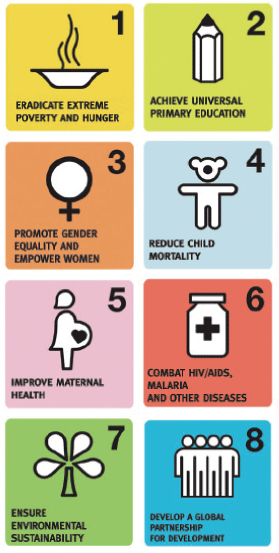 |
KPMG supports UNO’s eight Millennium Development Goals. Globally, we focus our actions on the first three of these: eradication of extreme poverty and hunger; universal access to primary education; promote gender equality and women empowerment. GRI 4.12 With respect to the third objective, we have encouraged conditions that contribute to a more flexible and inclusive working environment, which enables the professional development of women and their promotion to leadership positions within our organization. In Brazil, we currently have 24% of women holding positions of manager, partner-director and partner. KPMG International has a goal to reach 25% of women in leadership positions in the member firms, by 2015. KNOW – KPMG’s Network of Women in Brazil has worked to encourage this evolution. The contributions made by the group, include the monthly meetings with leaders, the coaching program, lactation center, reforming the maternity policy – from pregnancy until the child has completed one year –, external debates and events with female leaders and also the participation of KPMG in the movement +Mulher 360 and also in the Brazilian Network of Women Leaders for Sustainability.
The mission of this Group of Women is to “encourage the structured professional development, with greater retention of women in the Organization, seeking conditions compatible with career opportunities, providing resources to encourage them on their path towards personal and professional achievement”. |
Local hiring
GRI EC7
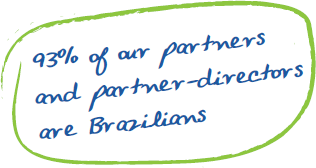 Promoting professional and personal development is fundamental for KPMG in Brazil. This is evident when we observe professionals who hold the most senior positions in the Organization and who joined KPMG at the start of their careers, and have gone through a continual growth process until they became partners.
Promoting professional and personal development is fundamental for KPMG in Brazil. This is evident when we observe professionals who hold the most senior positions in the Organization and who joined KPMG at the start of their careers, and have gone through a continual growth process until they became partners.
This type of incentive is extremely important for KPMG, since it guarantees a team that is committed to the Organization’s objectives and growth. We also encourage local talent, placing regional interests as a focus in our business.
| Local hiring | |||||||||
|---|---|---|---|---|---|---|---|---|---|
| Local | Total partners and partner-directors | Partners and partner-directors who work in the States where they were born | |||||||
| Absolute numbers | Absolute numbers | Percentage | |||||||
| 2011 | 2010 | 2009 | 2011 | 2010 | 2009 | 2011 | 2010 | 2009 | |
| State São Paulo* | 181 | 143 | 137 | 135 | 101 | 92 | 75% | 71% | 67% |
| State Rio de Janeiro* | 34 | 24 | 22 | 22 | 17 | 16 | 65% | 71% | 72% |
| Other states* | 28 | 21 | 21 | 11 | 8 | 8 | 39% | 38% | 38% |
| Total in Brazil | 243 | 188 | 180 | 226 | 172 | 161 | 93% | 91% | 89% |
*São Paulo and Rio de Janeiro are the states with the highest number of partners and partner-directors in Brazil, which is why we have presented the indices between three categories: State of São Paulo, State of Rio de Janeiro and other States.
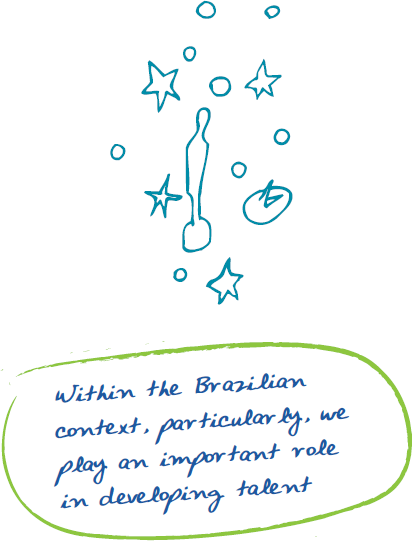 Quality services
Quality services
Learning and development
The Learning and Development programs are the focus of our investments and go beyond the professional regulations for continued education, encouraging graduate, post graduate and specialized courses, language courses, behavioral training, exchange programs (KPMG Mobility Program) and a variety of technical courses.
| Educational level of KPMG professionals in 2011 |
||
|---|---|---|
| Number | Percentual | |
| Higher or university education | 3,726 | 97.3 |
| High school/ elementary schooling | 95 | 2.5 |
| Technology | 9 | 0.2 |
| Total professionals | 3,830 | 100.0 |
KPMG Business School is responsible for the planning and development program. In São Paulo, we have a Training Center where we concentrate the activities of learning and development, facilitating access and reducing costs. However, with the increased number of offices in other regions, we are studying the possibility of having other training centers in Brazil.
Our training is segmented in order to develop different skills and abilities:
Corporative: compulsory for all professionals, develops behavioral skills, teaches corporate norms and policies, such as Risk Management, Ethics & Independence and Data Privacy.
Core training: compulsory for all professionals, and consists of the training necessary to develop the technical knowledge and skills, by activity area, and to develop the standard of excellence in providing services.
Professional training course: teaches the concepts related to the methodology for performing services in each professional area.
Specialization course: develops specific issues, recommended by leaders, according to professional requirements.
| Total investment in Learning and Development | |||
|---|---|---|---|
| 2011 | 2010 | 2009 | |
| Time (thousand hours) | 366 | 285 | 305 |
| Financial (R$ million) | 24.9 | 23.0 | 21.7 |
| a) Specific investments in technical and behavioral skills | 10.5 | 10.9 | 8.5 |
| b) Investments in graduate, post-graduate, language courses, exchange programs and other | 14.4 | 12.1 | 13.2 |
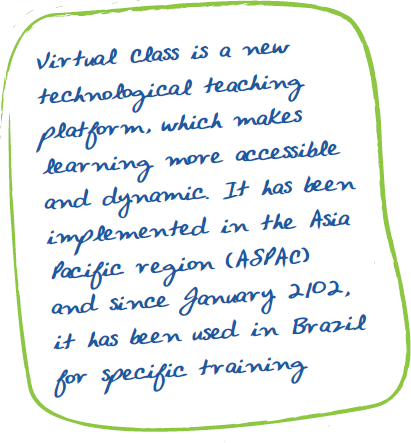
Policy for continual professional education
According to the Federal Accounting Council (CFC), all technical professionals have to complete the Continued Education Program, where they receive the compulsory 40 hours of training per year – completing a minimum of 120 hours in three years - in order to guarantee the continuity of the learning process, and ensuring our professionals are up to date and aware of the technical procedures essential for the quality of our services.
KPMG is committed to fulfilling the program and creating opportunities to maintain a team of excellence and high performance, and thus goes beyond what is required: our professionals received an average of 95 hours training in 2011, besides this, we voluntarily extended the rule for continued education to our professionals from the administrative area.
| GRI 4.7 | LA10 | |||||||||
| Hours invested in Learning and Development – KPMG Professionals | |||||||||
|---|---|---|---|---|---|---|---|---|---|
| 2011 | 2010 | 2009 | |||||||
| Hours | People | Average | Hours | People | Average | Hours | People | Average | |
| Technical team | |||||||||
| Apprentice | 509 | 5 | 102 | N/D | N/D | N/D | N/D | N/D | N/D |
| Trainee | 106,480 | 1,041 | 102 | 124,876 | 787 | 159 | 111,367 | 625 | 177 |
| Staff | 135,656 | 1,369 | 99 | 98,676 | 1,172 | 84 | 118,519 | 1,015 | 117 |
| Manager | 37,116 | 340 | 109 | 30,479 | 313 | 97 | 36,538 | 273 | 134 |
| Partner and Partner-director | 25,422 | 217 | 117 | 18,218 | 183 | 194 | 18,462 | 168 | 219 |
| Subtotal Technical team | 305,182 | 2,972 | 103 | 272,198 | 2,454 | 111 | 283,886 | 2,081 | 136 |
| Administrative team | |||||||||
| Apprentice | 1,019 | 16 | 64 | N/D | N/D | N/D | N/D | N/D | N/D |
| Trainee | 3,876 | 70 | 55 | 0 | 0 | 0 | 96 | 1 | 96 |
| Staff | 42,157 | 668 | 63 | 11,111 | 209 | 53 | 19,303 | 247 | 78 |
| Manager | 8,293 | 78 | 106 | 1,142 | 14 | 82 | 1,275 | 15 | 85 |
| Partner and Partner-director | 5,117 | 26 | 197 | 426 | 5 | 85 | 930 | 12 | 150 |
| Partner and Partner-director | 60,462 | 858 | 70 | 12,730 | 229 | 56 | 21,604 | 275 | 79 |
We have improved the data collected in 2011, including the category “Apprentice”. In previous years, the Apprentices were included to the category staff.
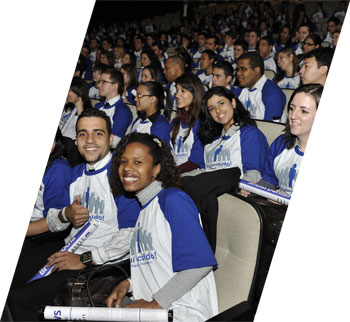 Annual Trainee Program
Annual Trainee Program
We want to develop young professionals, consequently, we make a significant investment in our Annual Trainee Program, which aims to attract, contract and train excellent talent on the market. In 2011 approximately 38 thousand candidates participated in the selection process, and 714 were hired.
All trainees have to complete an intensive training program before starting to work in the business areas, with the program for audit trainees comprising 172 hours. The objective is to develop our main principles and standards
of quality, as well as developing our values within the context of corporate citizenship.
| KPMG Annual Trainee Program | ||
|---|---|---|
| 2011 | 2010 | 2009 |
| 714 | 437 | 274 |

Mobility and Exchange
We want our professionals to have a global mindset and a forward-thinking. We want them to reach their full potential and be able to develop their careers. The exchange of knowledge with professional practices abroad is part of the Learning and Development program. Through the Mobility Program, it is possible to implement exchanges between the KPMG International member firms, with the opportunity to learn different languages and cultures, and obtain an important understanding of our global structure, our values and our services.
| Mobility Program | ||||
|---|---|---|---|---|
| Programa | Duration | Professional participants | ||
| 2011 | 2010 | 2009 | ||
| Global Opportunities | 1 to 3 years | 21 | 6 | 26 |
| Global Internship Program | 1 month | 8 | 7 | 1 |
| Tax Trek | 3 months | 4 | 5 | 7 |
Partner Development Program (PDS)
Public: involves 100% of partners in three years (2010 to 2012).Academic / FDC: supported by a renown university, the pillar consists of six modules that cover themes such as innovation, business management, international business, leadership, people management, sustainability and corporate responsibility.
Individual / LALDP: structured by a consulting company specialized in developing top leadership, includes subjects such as leadership style, KPMG strategy, communication, amongst others.
 Chairman 75 Program
Chairman 75 Program
Public: 75 partners from KPMG worldwide with the perspective of assuming leadership positions.
Duration: 18 months.
Dynamic: quarterly meetings, lasting three days, during which the participants interact with external consultants, CEOs from other companies and other leaders from KPMG, debating relevant issues and leadership responsibilities.
Developing Leadership
GRI 4.7
As part of the succession process for our main executives, we implement specific learning and development programs for leadership, which prepare our professionals for their future responsibilities. The main programs in this context are the Chairman 75 and the Partner Development Program (PDS).
Assessment and feedback
Our global career development policy is based on the principles of merit and equal opportunities. For such, we have counseling and annual performance assessments, to enable our professionals to accompany their performance, identify positive points and improve technical or behavioral aspects. Through the promotions, we recognize our professionals and their contribution to our business and make feasible our career and succession plan.
With respect to access to top leadership, the professionals who report excellent performance are indicated to become members of the company. They are assessed and interviewed by an external consulting firm and then by members of the Executive Committee in Brazil, as well as senior partners from KPMG International.
| Number of promotions | |||
|---|---|---|---|
| 2011 | 2010 | 2009 | |
| Staff | 1,872 | 1,059 | 1,080 |
| Staff to manager | 106 | 90 | 48 |
| Manager to senior manager | 78 | 49 | 28 |
| Senior manager to partner-director | 26 | 25 | 8 |
| Partner-director to partner | 13 | 17 | 8 |
| Total | 2,095 | 1,240 | 1,172 |
Assessment and feedback tools
1. Dialogue
- Participation during the period: 96% of the professionals, excluding apprentices, temporary staff and outsourced workers. In 2010 and 2009, participation was 73% and 85%, respectively.
- Three stages: Goal Setting (establish corporate and individual goals), Interim Review (assessment and re-establish objectives) and Year End review (final assessment of objectives established for the year).
- Validation of performance manager (Professional responsible for accompanying and orientating another professional’s career).
- Include corporate and eco-efficient goals, as detailed in the sub-title Corporate Citizenship/Environment.
2. 360º Assessment
- Participation during the period: 91% of target public (partners, partners-directors and managers). In 2010 and 2009, participation was 96% and 100%, respectively.
- Involves assessment by superiors, peers, subordinates and internal clients.
Remuneration
GRI EC5

Periodic research into the four largest companies from the sector and mapping of market practices act as our reference for remunerating our professionals.
Promotions and salary evolutions are defined based on the results of performance assessments. Compared to the national minimum salary, the salaries paid by KPMG during this period were at least 29% higher for the administrative team and 38% higher for the technical team.
Another important incentive is the Profit Sharing Program (PPL), which assesses the goals from the Dialogue system and the results of the Organization, business unit and the professional, throughout the year.
In the case of partners, including the Chairman, the same principles are adopted and remuneration is aligned to the profitability of the business and the performance assessments, as well as the strategic and socio-environmental goals, with the latter being educational. GRI 4.5
| Relation between the lowest salary at KPMG and the minimum national salary | |||
|---|---|---|---|
| Technical team | |||
| Office (important operational unit) | 2011 | 2010 | 2009 |
| São Paulo | 38% | 122% | 125% |
| Rio de Janeiro | 128% | 155% | 126% |
| Other units | 132% | 116% | 137% |
| Administrative team | |||
| Office (important operational unit) | 2011 | 2010 | 2009 |
| São Paulo | 29% | 27% | 35% |
| Rio de Janeiro | 35% | 57% | 55% |
| Other units | 69% | 18% | 35% |
The data for 2009 and 2010 was recalculated based on the minimum national salary for greater clarity and consistency.
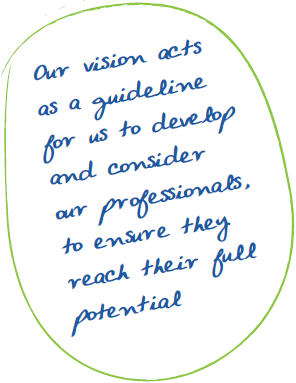
Focus on the Individual
GRI LA3
By creating the conditions that enable our professionals to develop and obtain professional and personal satisfaction, we provide our services with excellence and create value for our clients. This is a central question to KPMG, because people and business form an inseparable link.
| Benefits | |
|---|---|
| Benefit | Public benefited |
| Gym | All professionals |
| Medical assistance | All professionals |
| Dental assistance | All professionals |
| Crèche assistance | Local collective agreement – mothers with children aged up to 7 and fathers who have custody of children |
| Sickness assistance | All professionals – according to local collective agreement |
| Annual medical Check-up | Partners and partners-directors |
| Parking | In São Paulo, as from analyst and consultant level (technical areas) and analyst and senior consultant level (administrative area) |
| Incentive for post graduate courses | As from manager level |
| Language course | All professionals |
| Financial incentive for professionals fluent in English, Spanish or Japanese |
All professionals from the technical area who provide evidence of fluency |
| Life insurance | All professionals |
| Payroll loans | All professionals after 12 months employed according to CLT system |
| Subsidy for fees to professional organizations (registration Fees, transfers and annuity) |
All professionals |
| KPMG Prev (complementary retirement plan) | All professionals employed under CLT system |
| Profit sharing program (PPL) | All professionals employed under CLT system |
| Meal subsidies | All professionals – local value |
| Wedding gift | All professionals – after 12 months employed according to CLT system |
| Transport tickets | All professionals |
| Incentive for graduate courses | All professionals |
Health and quality of life
Through the MyLife Program, we encourage healthy habits, well being and care of body and mind in our team members, which is then reflected in our business.
 Culture and Entertainment
Culture and Entertainment
we promote various cultural and entertainment events, such as special programs, options and discounts at artistic and cultural events. Besides being entertaining and relaxing, contact with art and music, in its various forms, is an activity that increases perceptions, sensitivity and intelligence.
 Health
Health
we promote awareness campaigns, prevention, vaccinations, health tips, and plans with gyms. During the busy season we have developed a campaign with tips available on intranet and communications on how to avoid stress, and we also offer free quick massage sessions at the São Paulo and Rio de Janeiro offices.
 Facilities
Facilities
we offer services that facilitate the daily routine of our professionals, such as partnerships with restaurants, shops, hairdressers and others. We have also created a “classified” section, where they can announce the purchase and sale of goods and services.
Efficiency project
This was created in 2009, for the purpose of assisting audit professionals to apply the KPMG methodology in the most efficient way, optimizing the time dedicated to projects without affecting the final quality and encouraging a greater balance between professional and personal life. The goal is to make the Efficiency Project available to all of the audit team by 2011 was achieved.
Internal environment
Organizational climate
The organizational climate is one of the essential factors that enables us to retain talent and achieve our strategic object to be considered as one of the best companies to work for. The management of the organizational climate at KPMG is a continual improvement process, consequently, every two years we implement the Global People Survey (GPS) which measures the motivation and satisfaction of our team.
Each area, leaders and respective business partners (Human Resources) design specific action plans for their reality, aimed at improving these indices. The global People, Performance and Culture (PPC) team is redesigning our research, to ensure it continues to be effective and up to date, accompanying and monitoring the most significant questions for our professionals.
The new version of the GPS is programmed to be applied at the beginning of the corporate year 2012-2013. Nevertheless, to enable us to assess how we are progressing compared to our actions plans derived from the previous GPS, in March 2012, KPMG International will implement a sample called Pulse, with results from individual member firms, based on the redesigned indicators.
Results of the Global People Survey – Brazil 2010
(Satisfaction percentage – Scale of 0 to 100)
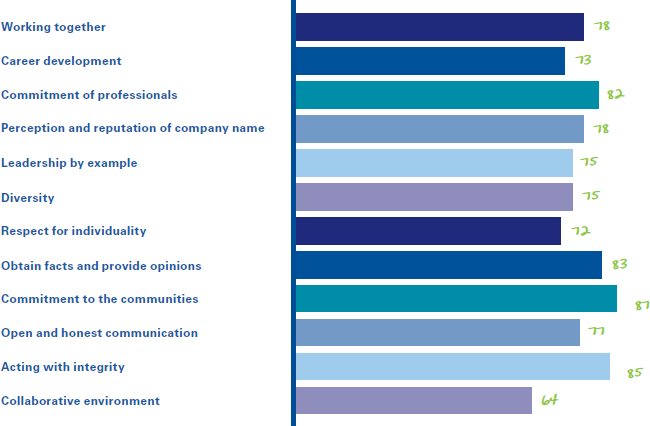



Corporate citizenship
GRI EC8
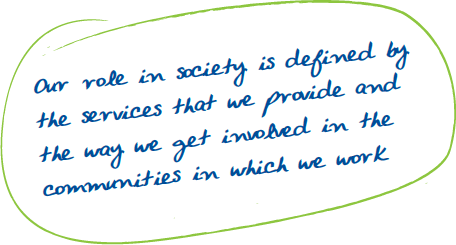 Corporate Citizenship derives from KPMG’s vision and values, and thus influences our strategy, our choices and our relationships with our stakeholders. We believe that business has a unique role and can contribute to resolve complex world problems, and that responsible practices and business help to encourage sustainable development.
Corporate Citizenship derives from KPMG’s vision and values, and thus influences our strategy, our choices and our relationships with our stakeholders. We believe that business has a unique role and can contribute to resolve complex world problems, and that responsible practices and business help to encourage sustainable development.
Although our stakeholders have prioritized other themes, they are also interested in understanding the positive impacts generated by KPMG at the places where it works, and which go beyond the intrinsic benefits generated from its services. And it is this issue we consider in this topic.
KPMG in Brazil works to construct transparency and trust on the market through the accuracy of our financial reports, and by assisting companies to improve their management systems. We are aware that there is still room to advance in the direction of our vision, leveraging the potential of our communities, KPMG International has assumed certain commitments that help us on this journey.
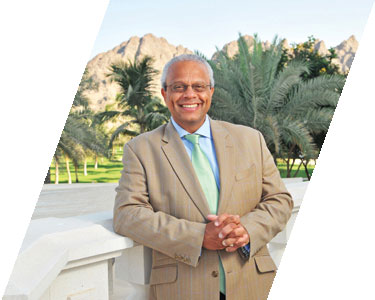 “KPMG International’s vision states boldly and clearly that in order to build and sustain our reputation as the best organization to work with, we must continue to support our people, clients and our communities in achieving their full potential. These words have the deepest significance. This commitment unites KPMG’s leaders and our people in a common goal to build strong sustainable communities both where we have operational businesses but also in the toughest corners of the world where we chose a path of responsibility and engagement to make a defining difference in ordinary people’s lives. We must choose to lead change in our world”
“KPMG International’s vision states boldly and clearly that in order to build and sustain our reputation as the best organization to work with, we must continue to support our people, clients and our communities in achieving their full potential. These words have the deepest significance. This commitment unites KPMG’s leaders and our people in a common goal to build strong sustainable communities both where we have operational businesses but also in the toughest corners of the world where we chose a path of responsibility and engagement to make a defining difference in ordinary people’s lives. We must choose to lead change in our world”
Lord Hastings of Scarisbrick, CBE
Global Head of Citizenship KPMG International
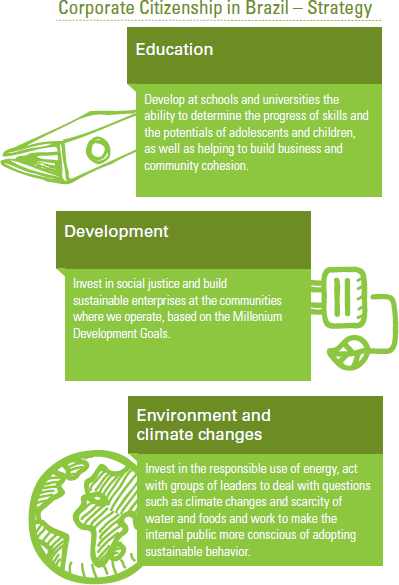 Since 2003, KPMG International has been a signatory to the United Nations Global Compact and annually presents its Communication on Progress report to this organization. By being a signatory to the Pact it extends to its member firms the commitment to its ten principles that cover four main areas: Human Rights, Labor Rights, Environment and Anticorruption Measures. KPMG International has also adopted the UNO’s eight Millennium Development Goals.
Since 2003, KPMG International has been a signatory to the United Nations Global Compact and annually presents its Communication on Progress report to this organization. By being a signatory to the Pact it extends to its member firms the commitment to its ten principles that cover four main areas: Human Rights, Labor Rights, Environment and Anticorruption Measures. KPMG International has also adopted the UNO’s eight Millennium Development Goals.
These two external commitments act as guides for the operational strategy at all of the member firms worldwide, potentializing the positive impacts that are placed in practice through two of KPMG International’s global programs: the Global Development Initiative, which deals with questions related to development and social justice and the Global Green Initiative, which addresses questions related to the environment and climate changes.
The International Directory of Corporate Citizenship at KPMG International are responsible for defining, organizing and encouraging the guidelines and accompanying the performance of sustainability practices at the member firms. The decisions regarding actions, however, remain with the member firms which, based on the global guidelines, design their action plan adapted to their local realities.
KPMG in Brazil has been increasingly committed and collaborative. Through a reflective process and a more integrated vision, it has observed the connection between sustainability and its business and understood how to potentialize its positive impacts and minimize the negative impacts arising from its actions, both on society and environment.
In Brazil, R$ 2.2 million was invested in the community during this period. Our main initiatives are presented in the following pages and have been divided between three fundamental strategies for Corporate Citizenship in Brazil: Education, Development and Environment. It is worth noting, however, that the initiatives are transversal, i.e., they can be reported in any of these pillars, but they also have a positive impact on the others.
As a result of its effective engagement with the Global Compact and with various United Nations Organization (UNO) initiatives aimed at influencing public policies in the search for equality, in January 2011, KPMG International was invited to be a member of LEAD, a platform for corporate sustainability leadership, launched at the World Economic Forum, in Davos. For more information access: http://www.unglobalcompact.org/HowToParticipate/Lead/index.html
Education
Education is an essential factor for our business, and also for the development of Brazil. Leverage of the full potential of the communities involves training and developing the skills of individuals. Consequently, we intend to work together with schools, universities and NGOs to strengthen the skills of children and young adults. In practice, this support is also provided through projects that are detailed below.
Little Citizen Project
What is it: program that offers a cycle of four years supplementary educational activities, medical and nutritional supervision, daily meals and sports activities.
Public: 220 children, aged between 10 and 14, from needy neighborhoods in São Carlos (SP), a city where we have one of our offices.
Objective: encourage self esteem, strengthen family ties and develop the intellect of the students.
Investment: R$667 thousand by KPMG, besides the support from São Paulo University (USP), which offers the infra-structure for the Project at the São Carlos and FUSP campus, which manages the project’s resources.
Involvement of KPMG professionals: participation during the visits from the project to the KPMG offices in São Carlos e São Paulo, and at the project’s commemorative events. KPMG also accompanies the development of the Project and acts as advisor together with the pedagogical and coordination teams, in order to improve the programs. The professionals from São Carlos also audit the Project accounts.
| Statistics for Little Citizen Project – 1996 to 2011 | |
|---|---|
| Children attended | 2,300 |
| Individuals attended indirectly (families) | 11,500 |
| Art and education activities (hours - class) | 22,460 |
| Sports activities (hours - class) | 37,507 |
| Library activities and digital inclusion – inauguration of library in 2000 (hours - class) | 6,775 |
| Lending of books and issues from the library | 24,738 |
| Additional tutoring activities – research groups (hours - class) | 11,465 |
| Dental consultations | 2,247 |
| Meals served | 827,994 |
| Referral of adolescents trained in vocational courses | 361 |

Bessan Award
This consists of a study grant for high school given to the students who obtained the best results during the Little Citizen Project. In 2011, four students received grants and the investment was approximately R$40 thousand.
Apprentice Nucleus
This is a pilot program to be implanted as from 2012, and was created to complement the support to adolescents graduating from the Little Citizen Project when they reached the age of 14. The Project, in partnership with Sesi and Senac will offer these adolescents the opportunity to continue to be involved with the Project for another year, and will receive complementary courses offered by these institutions, which will provide them with information on the employment market, attitudes during interviews and employment related subjects.
Students in Free Enterprise (SIFE)
What is it: a non for profit, global institution, which encourages undergraduates to use their knowledge and entrepreneur skills to develop social-educational programs that benefit the communities, with sustainability and the empowering of these communities acting as the criteria for these projects.
Investment: R$50 thousand.
Involvement of KPMG professionals: participation of KPMG professionals in the Board of Directors, audit of the results from the National Championship and advising teams when requested.
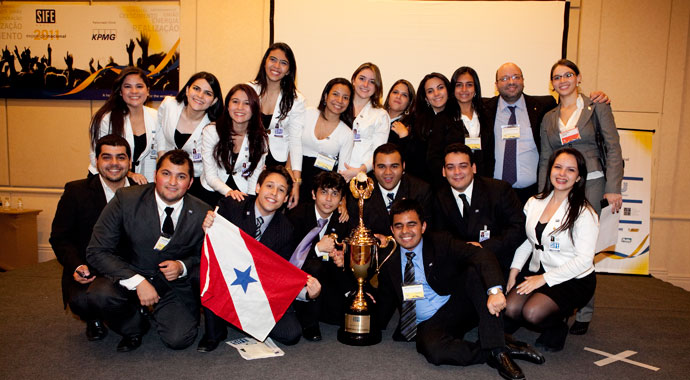
In addition, the winning team receives three air tickets so they can represent SIFE Brazil in the SIFE World Cup, held annually in a different country. KPMG International will be the official sponsor of the international event from 2012-2014, and various member firms throughout the world support SIFE locally.
Junior Achievement
What is it: an organization focused on practical education about the economy and business, that aims to encourage an enterprising spirit, stimulate personal development and facilitate access to the employment market.
Investment: R$127 thousand.
KPMG in Brazil’s Involvement: KPMG’s involvement with Junior Achievement (JA) began in 2002. This involvement became more intense as from 2009, when KPMG became one of the national sponsors of JA, and started to encourage its professionals to be volunteers in introducing the project in public schools. In the medium term, we hope to engage all of the KPMG offices in this initiative; for 2011 we achieved the goal of engaging five new offices.
We ended the year with ten offices participating and 97 volunteers applying the programs Mini-company, Let’s Talk About Ethics, Personal Economy, The Advantages of Remaining at School and an Introduction to the Business World, which benefited 1553 students throughout Brazil. For 2012, the goal is to include three new offices in the volunteer program.
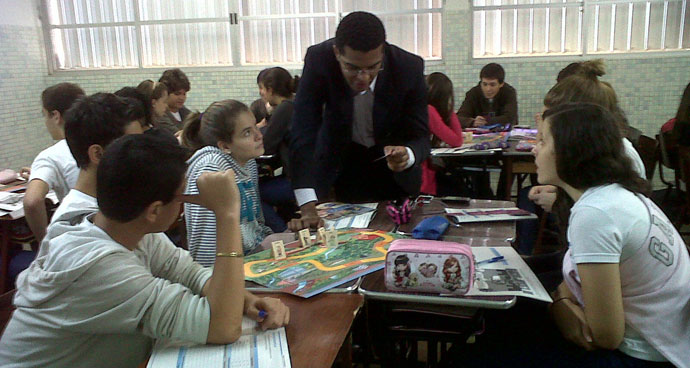
Bio-diversity in your rucksack – WWF Brazil
GRI SO5
What is it: a pilot program for environmental education on the Cerrado biome with involvement from public school teachers in Pirenópolis, Goiás and specialists from the WWF. The program will last for three years and has the potential to benefit 5 thousand students from public schools each year.
Investment of KPMG in Brazil during this period will be approximately R$380 thousand. In 2011 the investment was R$98 thousand.
Uniética
KPMG is one of the sponsors of this event that is implemented by the Ethics in Business Brazilian Institute. Uniética encourages ethics, social responsibility, transparency and sustainability by university undergraduates throughout Brazil. The event involves approximately 200 students who actually participate, and approximately twenty thousand students who watch the event virtually.
Investment: R$18 thousand.
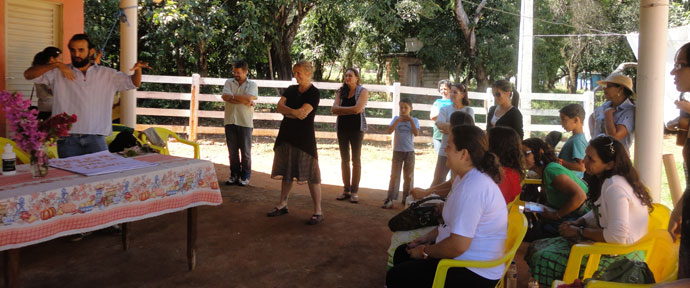
Book – Earth and the Human Element
This was the first of four volumes from the series Earth, Air, Water and Fire – Sustainability of the four elements of nature, published in 2011. The book is given as a gift to clients at the year-end, and was selected by the Marketing area for cultural investment.
Investment: R$185 thousand.
Açúcar de Piracicaba Museum – São Paulo
In addition to the historic and pedagogical aspects, the restoration and architectonic adaptation of Engenho Central (Machine Center), transforming it into the Sugar Museum, will provide the community with access to extraordinary cultural and educational resources. The initiative was taken by the Instituto Brasil Leitor and made feasible through cultural support from KPMG in Brazil.
Investment: R$100 thousand.
Development
KPMG’s Global Development Initiative (GDI) is the basis for our activities for this Development Pillar, since it focuses on promoting and making feasible sustainable enterprises. Our global guideline helps us to view big challenges through the lens of opportunity and based on our professional skills placed in practice throughout the world, collaborates to achieve the Development Objectives for the Millennium. Our global efforts are directed, above all, towards the first three objectives.
The eight Millennium Development Goals are the initiative of the United Nations, aimed at encouraging people and companies to act in favor of positive changes in their local communities (www.pnud.org.br/odm). KPMG reinforces its commitment to this development by participating in two other initiatives: the World Economic Forum, which unites business and political leaders, intellectuals and journalists to discuss and find solutions to the more urgent questions faced worldwide and The United Nations Global Compact, a platform with the ten principles to be adopted by organizations committed to sustainability and to responsible business practices in the labor, environment, human rights and anti-corruption areas.
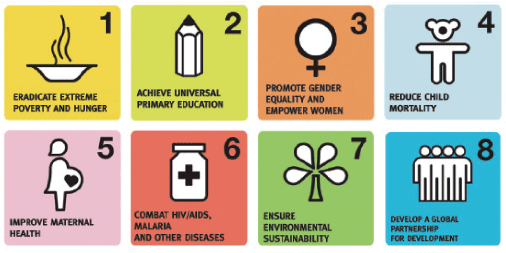
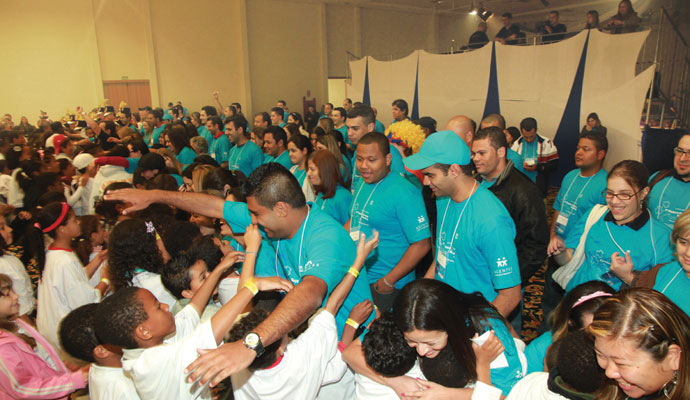
Principles of The United Nations Global Compact
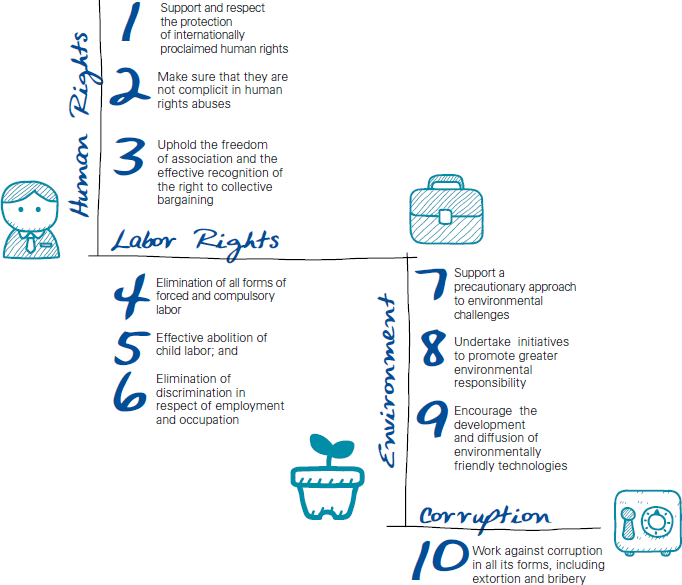
In Brazil, our way of collaborating towards development and improving the conditions of our communities is through the following initiatives:
Providing pro bono services or compensation
GRI EC8
Putting our skills into practice and transforming our knowledge into value in the communities is the way that KPMG can best contribute towards developing solutions and sustainable enterprises.
Our audit and advisory services in the form of pro bono/compensation work1 fulfills this role in not for profit organizations from the third sector in various Brazilian cities, providing professionalism and the credibility and transparency necessary for the financial statements of these organizations, thus providing them with better conditions to ensure the continuity of their operations and services in the various segments and communities in which they operate.
1 Services provided to NGO and non profit making institutions. The amount for the services provided is paid by the Corporate Citizenship team to the KPMG area responsible for the rendered service and the organization benefited accepts to undertake an action previously agreed as compensation for the services provided.
Companies from the third sector benefiting from pro Bono/compensation services
- Ação Comunitária – São Paulo (R$ 42 thousand)
- Portal Dajuda Association – São Paulo (R$ 12 thousand)
- Saúde Criança Renascer Association – Goiânia (R$ 34 thousand)
- Gol de Letra Foundation – São Paulo and Rio de Janeiro (R$ 45 thousand)
- OSESP Foundation – São Paulo (R$ 200 thousand)
- ABCD Institute – São Paulo (R$ 21 thousand)
- Ethos Institute – São Paulo (R$ 80 thousand)
- Ling Institute – Porto Alegre (R$ 15 thousand)
- 41st Winter Festival in Campos do Jordão – Santa Marcelina ($ 26 thousand)
- IBEF Ceará – Prêmio Equilibrista (R$ 14 thousand)
This work is subject to the standard procedures for acceptance of any client, and the same methodology, and therefore assure the same quality and independence.
Since 2007, we have accumulated 7,760 hours from providing services of this nature. In 2011, 1,260 service hours, estimated at R$490 thousand, were provided to institutions from the third sector.
Private social investment
Unicef: KPMG supported the Monitoring and Assessment area of UNICEF to produce technical and research material, such as: production of information derived from PNAD 2010 and the preliminary results of the Demographic Census; organization of the separate information in software; refined data on HIV/ AIDS; data on indigenous community population.
The on-line system developed will help to understand the context of each Brazilian region, and can be accessed by non government organizations (NGOs) and the public in general via Unicef’s webpage.
Investment: R$50 thousand.
Millennium Villages: the Project consists of various international partnerships, including KPMG International and 14 of its member firms, including Brazil. It consists of finding solutions for developing ten sub-Saharan cities in Africa.
The project will last for five years, during which it will work towards empowering the local community, to enable it to become sustainable, generating solutions that address problems such as hunger, illnesses and illiteracy, amongst others. Investment by KPMG in Brazil: USD 5 thousand/year, during three years. Initial Investment in 2011 of approximately R$8 thousand.
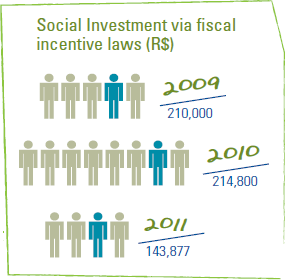 Social investment through
fiscal incentive laws (IRPJ)
Social investment through
fiscal incentive laws (IRPJ)
GRI EC4
KPMG is abreast of the opportunities offered by the Government to encourage the allocation of resources to institutions that offer services to the community.
Every year we assess social and cultural projects that are aligned with our Corporate Citizenship and Marketing strategies and which can receive benefits.
Quero-Quero Project
Encourages actions in favor of cultural, social, psychological, cognitive and affective development of 180 children and adolescents from needy neighborhoods in Campinas. The project develops a sense of responsibility and improves the quality of life of these children.
Support: R$5 thousand via Rouanet Fumcad/FIA Law and R$8 thousand via private social investment.
Fight for Peace Institute
Encourages sports and educational activities for children and young adults aged between 7 and 25, at the Maré complex (Rio de Janeiro/RJ), encouraging social inclusion, psychological and social support, stimulating leadership and preparing them for the employment market.
Support: R$21 thousand through the Sports Incentive Law.
Ponto a Ponto Project
This project produces a publication in Braille, the Point to Point Bulletin, with transcription of newspaper articles, magazines and other themes for the public with visual impairments.
Support: R$35 thousand through the Rouanet Law.
Evita
Dance Show from the 2011 Season at the Alfa Theater. Supports culture and the possibility of an exclusive show for client relations and prospects.
Support: R$83 thousand paid via Rouanet law, and an investment from KPMG Marketing area for the amount of R$167 thousand.
Volunteering
KPMG wishes to lead by example and create a network of multipliers in favor of social-environmental development. We encourage our professionals to become involved and offer volunteer work.
In addition to the voluntary work at the Junior Achievement programs, our professionals can also participate in two other activities that occur annually: Trainees Challenge and KPMG in the Community.
Trainees Challenge was launched in 2008 and is part of the trainee program for these new professionals. Since then, these professionals have been involved to meet a variety of needs within our communities, such as: donating blood, helping the elderly, adolescents and children, education, revitalizing common areas in public and private institutions, environmental awareness, amongst others.
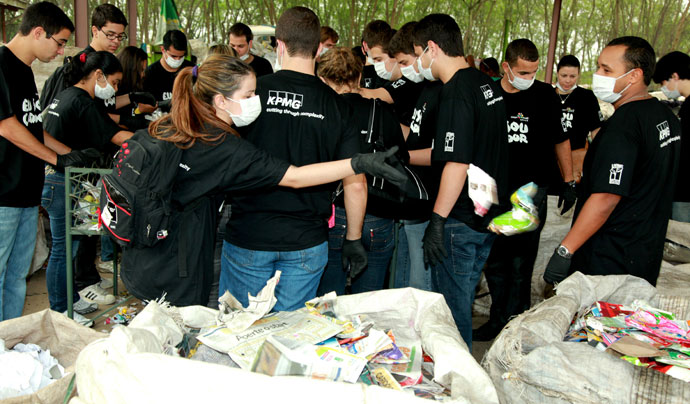
| Results of Trainees Challenge | ||||
|---|---|---|---|---|
| 2011 | 2010 | 2009 | 2008 | |
| Total trainee participants | 417 | 464 | 247 | 350 |
| Total hours donated | 1,734 | 3,918 | 2,438 | 3,360 |
| Total public affected | indeterminate | 1,623 | 1,605 | 1,718 |
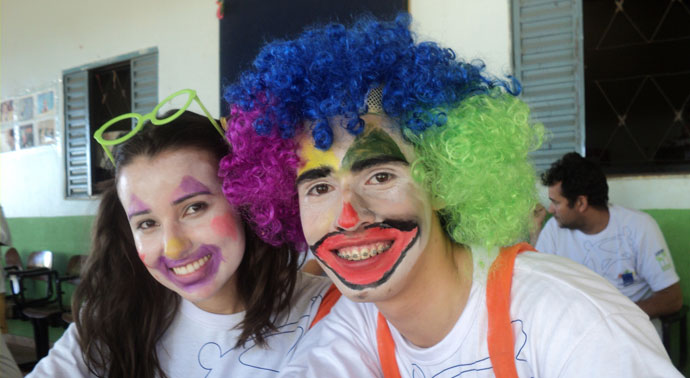
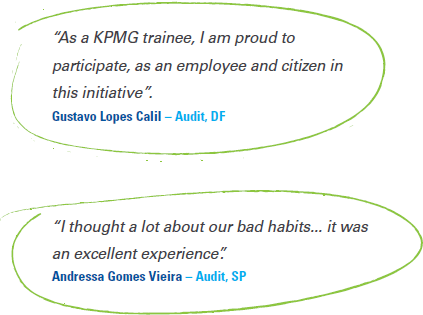 KPMG Community Day is an action that involves professionals from all of the KPMG offices in Brazil, in citizenship actions to meet the specific needs identified in their communities.
KPMG Community Day is an action that involves professionals from all of the KPMG offices in Brazil, in citizenship actions to meet the specific needs identified in their communities.
| Results of KPMG Community Day | ||
|---|---|---|
| 2011 | 2010 | |
| Volunteers engaged | 493 | 409 |
| Social institutions attended | 21 | 22 |
| People potentially benefited | 1,200 | 1,200 |
Specific programs, emergencies
and disasters relief
Devastating natural disasters occur throughout the world, affecting our people, our communities and our business. Our ability to mobilize and take action during these times of crisis can make a difference and offer comfort. Our technical skills can help in the management of the recovery process of the communities affected and bring long term benefits.
This system for planning the most appropriate action to be implemented in each situation, including combining two types of action, is performed by the Global Citizenship Leader from KPMG International.
In 2011, we faced some crisis situations, both internationally and locally. During the year, professionals from various offices also acted in specific situations. Presented beside are examples of our contributions in Brazil.
Results of the KPMG campaigns in Brazil
Approximately R$19 thousand sent to the Red Cross in Brazil to be sent to victims of the earthquake following the tsunami in Japan. Of the total, R$3,986.93 was donated by our professionals and R$15.000,00 by KPMG. The support given by all of the KPMG International member firms amounted to more than US$3 million.
R$17 thousand donated by KPMG in Brazil to UNICEF to support the Horn of Africa region (Somalia, Djibouti, Ethiopia and Eritrea).
R$8 thousand donated to Turma da Sopa by means of items such as blankets and food. Of this total, our professionals contributed R$2.468,60. Turma da Sopa attends the homeless in situations of risk and interviews and refers drug addicts for detoxification treatment.
R$8 thousand to the Christmas Solidarity, campaign R$2,995.00 for the afternoon tea at the homes attended and R$5,519.80 to purchase geriatric diapers.
R$7 thousand invested in KPMG Community Day, as reimbursement to cover part of the expense of each of the coordinators and their teams for implementing the action at the NGO of their choice.
37 food baskets delivered to Casa dos Velhinhos de Ondina Lobo in the Stakeholder Engagement Project, as thanks to each stakeholder who agreed to participate in our consultations for materiality definition to our sustainability report.
Supplier management
GRI HR2
The service contracts and contracts with suppliers to provide essential materials for KPMG’s business, such as notebooks, are considered significant, given their strategic importance.
All of our service contracts include clauses requiring that the professionals employed by our suppliers are registered in accordance with CLT and aligned to the principles and conventions of the International Employment Organization.
Payment of these suppliers is dependent on presentation of monthly documents that provide evidence of the employment relationship. In 2011, no contract was refused due to a negative evaluation arising from violation of human rights.

In the case of purchases of materials, our goal for 2012, is to include specific contractual clauses on Human Rights in the standard draft documents and in the documents requesting proposals from suppliers. An international group, called Sustainable Procurement, is developing a Suppliers’ Code with basic guidelines that the KPMG International member firms can adopt.
Whenever possible, contracting and purchasing are made regionally, such as the case of paper and cleaning materials. Only the purchases of office supplies are centralized in São Paulo. As such, we aim to strengthen our commitment to developing local economies. GRI EC6
| Percentage of budget for purchases from local suppliers | |||
|---|---|---|---|
| Office (important operational unit) | 2011 | 2010 | 2009 |
| São Paulo | 98 | 93 | 89 |
| Rio de Janeiro | 95 | 99 | 94 |
| Other offices | 69 | 76 | 67 |
the information. Calculation base: purchases by the Facility, Marketing and Infrastructure area.
Environment
Commitments and global goals
GRI EN18
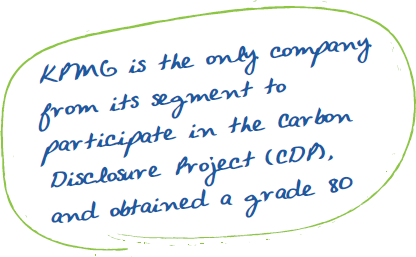
Our Commitment to the Global Compact, specifically the principles 7, 8 and 9, reflect KPMG’s attitude in relation to environmental questions.
KPMG has a Global Center of Excellence in Climate Changes and Sustainable Services (CC&SS) to assist our clients, in this complex and changing environment in which we live, to understand not only the challenges, but also the opportunities that, when well managed, could provide competitive advantages in this transition to a more sustainable development model.
At the same time, KPMG has considered this internally, and in response to the challenges imposed by climate changes, in 2008 KPMG International launched the Global Green Initiative (GGI), with one of its objectives being the reduction in the combined carbon footprint per capita of the member firms. In 2010, it reported a decrease of 29% compared to 2007, exceeding the goal established. A total of 42 member firms from KPMG International – including Brazil - participated in this report, which represent 85% of our personnel worldwide.
In 2011, a new global goal was established: by the year 2015, we should achieve a 15% decrease in the combined carbon net emissions per capita of the member firms, compared to 2010. This ambitious goal will be achieved through sustainable technologies, responsible travel, and the option for renewable energy and neutralization of our emissions, based on the purchase of certified reductions in emissions, particularly those that are available on markets regulated by the Kyoto protocol, as is the case of the European Union.
For KPMG in Brazil, our goal for 2012-2013, is to identify projects that have a carbon component, but which make a tangible contribution to the environment and society. We understand that carbon is an important item, but its contribution to sustainable development, in a clear and calculable form, is indispensible for purposes of assessing any investments to be made in projects.
Carbon footprint KPMG International member firms – 2010
29% reduction in net emissions per capita
20% reduction in net emissions
7% reduction in gross emissions
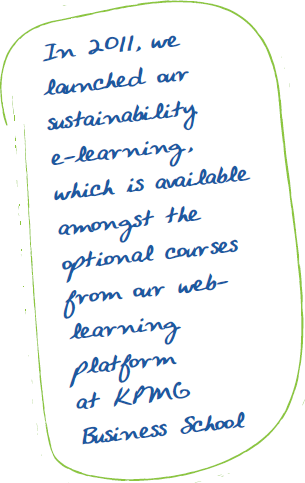
The Environmental Policy in Brazil
Management EN/EN28
KPMG in Brazil is a company from the Audit, Tax and Advisory services segment, and environmental aspects are not material for its operations, and therefore, we have not incurred any judicial or non monetary sanctions as a result of environmental non compliance during the period covered by this report.
Nevertheless, KPMG is aware of its responsibilities and maintains a citizen approach, since it understands that it also has a role to play for a more balanced and fair development model. Thus, it has an environment policy and goals to reduce some indicators.
GGI is the basis for our local environmental policy, which defines our commitment to improve the environmental performance of our business through coordinated actions that reduce our carbon footprint emissions per capita, and focus on conscious consumption of natural resources and decreasing the generation of residues, as well as the challenge to have a positive influence on clients, professionals and the community. Thus, like our country, KPMG in Brazil is growing and extending its operations with offices in Brazil, which is the reason for the increase in total consumption of the majority of the indicators as it will be noted.
The results of our actions and our dilemmas are presented in this sub-item.
| Local eco-efficiency goals | |||
|---|---|---|---|
| Indicator | Totais 2010 | Goal for 2012 | |
| KPMG in Brazil | Per capita (FTE*) | as % of FTE |
|
| Disposable plastic cups/unit. | 1,056,859 | 445 | Maintain |
| Electricity/GJ | 9,684 | 4 | Maintain |
| Paper/sheets | 10,614,400 | 4,467 | reduce 5% |
| Water/Cubic meters | 16,545 | 7 | Maintain |
| Printed material/sheets | 12,834,348 | 5,402 | reduce 5% |
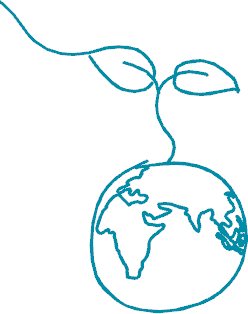
Environmental Education
The environmental performance of our business depends on the engagement of our people. Through constant dialogues with our professionals, we provide information, suggest changes in habits, we get them involved in actions and publish the results.
During the environmental week, our professionals answered the Living Green Quiz and if they achieved 75% correct answers, they participated in the raffle of various prizes, which, in 2011, included trips to Chapada Diamantina and Bonito, aimed at highlighting the importance of preserving the natural environment, and also gifts such as subscriptions to magazines, books and DVDs on environmental themes.
And for the children of our professionals, we launched the Living Green Gallery. Children aged between 4 and 12 were encouraged to paint pictures based on five themes: Earth: our planet, our future; Our Forests; Water: a resource essential for life; What I think is the most beautiful (or strange) thing in our vast bio-diversity; To guarantee the future, one of the things to be preserved in the environment is...The drawings were transformed into a lovely DVD which tells the story of the crab Kakau uncovering various habitats and giving sustainable tips to children. All of the sons and daughters of our professionals, aged between 4 and 12, received the DVDs.
To influence the community in significant questions that involve sustainability, we highlight the partnership with WWF Brazil in the pilot program Bio-diversity in your rucksack, detailed in the previous item, Education.
Another internal action, which also collaborated towards external awareness, was our support of the Limpa Brazil movement: Let’s do it. The movement, focused on conscious consumption, the correction destination of rubbish, and on recycling, organizes a symbolic event in various Brazilian cities, inviting volunteers to collect rubbish for one day. The movement was used as a basis for our Trainees 2011 Challenge, when our 321 trainees and 128 volunteers collected approximately three tons of recyclable rubbish in the neighborhood of Brás, in São Paulo. In Rio de Janeiro, 96 trainees visited the cooperative run by the Gramacho rubbish collectors, and spent one day as recyclable rubbish collectors, separating residues.
The book Earth, Air, Water and Fire – Sustainability in the four elements of Nature is a series of four volumes and the theme Earth is part of the first publication in 2011. The book is given to clients as a year-end gift, and was selected by the Marketing area for cultural support through the Rouanet Law. This is an example of how questions related to the environment are being discussed and considered in KPMG’s other areas, and go beyond our corporate environment.
Control of missions
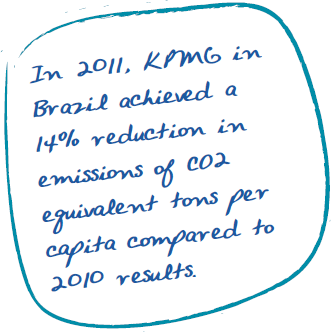
Due to the services sector in which we operate, our main impact on the environment arises from the emission of greenhouse gases. For this reason, in line with the global commitment to reduce GHG (greenhouse effect gases), since 2007 KPMG in Brazil has drawn up its carbon inventory and monitored its emissions annually. Thus, we identified that our most significant impact is in Scope 3 (on which we have no management, or management is limited), mainly due to the displacement of our professionals by air or ground transportation. GRI EN29
Transporting of our professionals to the clients’ premises is intrinsic to the type of services we provide, and represents the main dilemma faced, since, in the majority of cases, the activities have to be performed at the client’s premises. Consequently, our 25 offices attend clients with various local resources in the different regions, which contributes to our emission of GEE not being higher.
Since the size of Brazil requires that long trips be made, we have invested in technologies for virtual attendance, avoiding trips when possible. It is worth noting the increase in training via Web, the availability of audio and video-conference resources for meetings and the improvements in IT tools, which enable professionals to remotely access our network environment.
| Scope 1: 6,7% of emissions |
| Scope 2: 1,5% of emissions |
| Scope 3: 91,8% of emissions |
Composition of inventory of emissions
Scope 1 – Direct emission
|
Scope 2 – Indirect emissions
|
Scope 3 – Other indirect emissions
Other emissions1 |
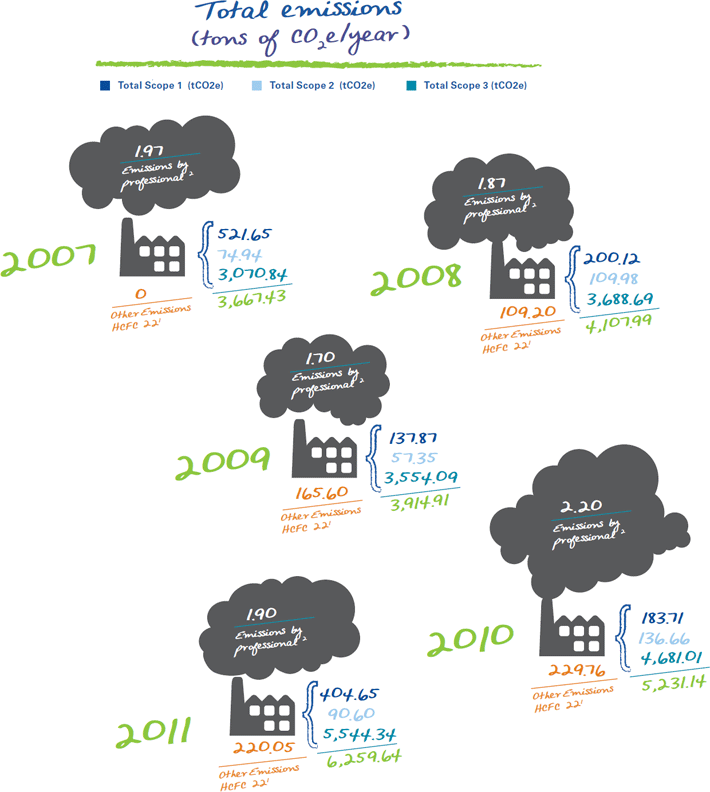
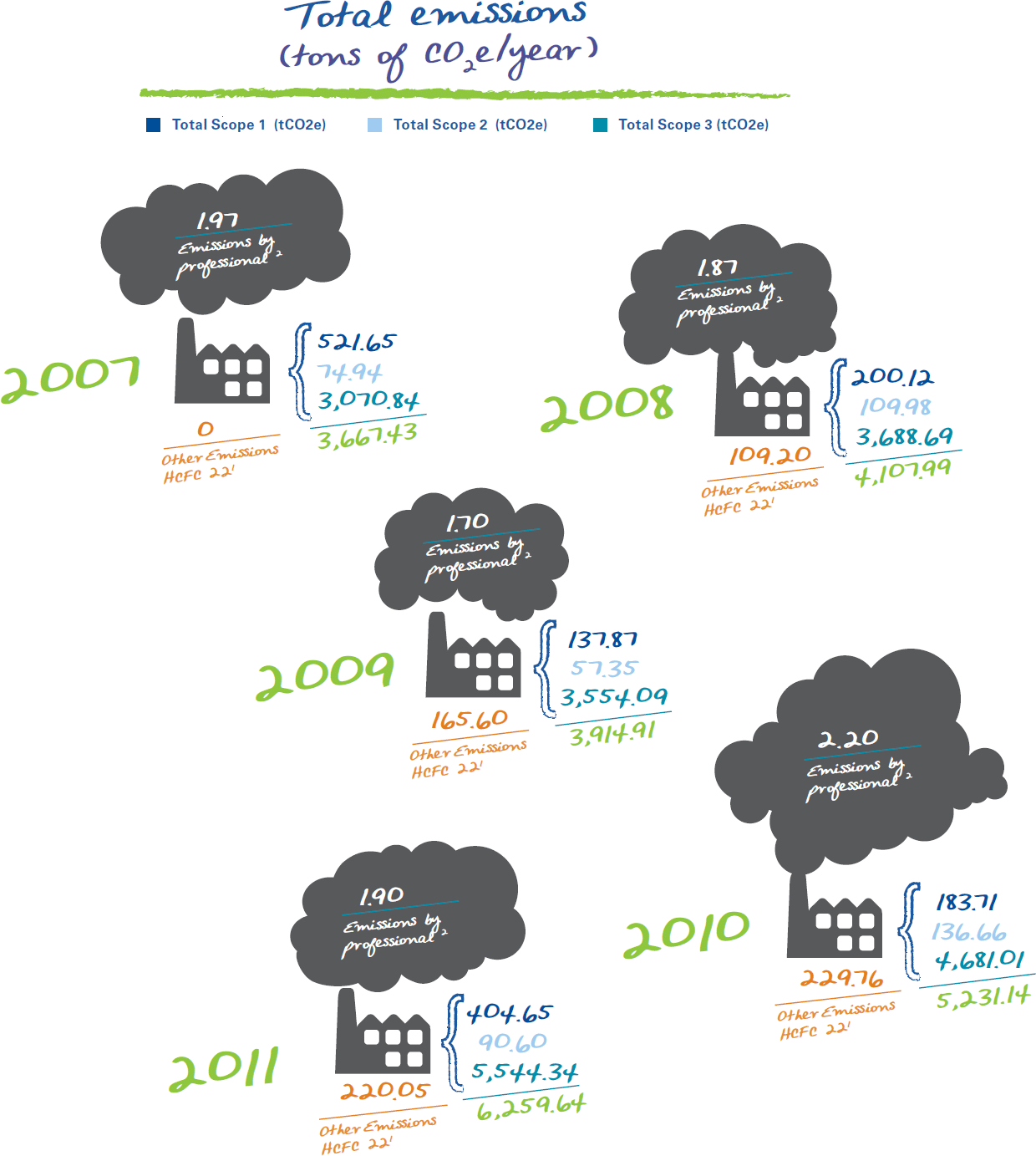
The data refers to the period January to December of each year. The method for this inventory was developed by KPMG International based on the GHG Protocol and DEFRA Reporting Guidance.
• KPMGI revised the data for reimbursement of transport to clients in 2010 (scope 3), which has been up dated in this table.
• In 2011 the decrease in emissions per capita was due mainly to the increase in the number of professionals in the Organization.
1 Following the assumptions from GHG Protocol, these emissions were not included in Scope 1, since the gas HCFC 22 is not included in the Kyoto Protocol.
2 The average number of employees used to calculate the emissions by Professional was provided by KPMG International.
Energy Consumption
Brazil is a world reference in offering clean sources for electricity production. Nevertheless, conscious consumption of this resource is still necessary. To reduce our consumption of electricity, we make our professionals aware of the need to change habits, we encourage attitudes that avoid wastage, we adapt our premises to avoid unnecessary consumption, such as installing presence sensors and we analyze the energy consumption when acquiring new electronic equipment.
Despite the per capita reduction in consumption of electricity, total consumption of this item increased at KPMG as a result of the growth in its business and in the number of offices in Brazil.
*The consumption per capita of direct and indirect energy was recalculated
based on the average number of employees provided by KPMG International.
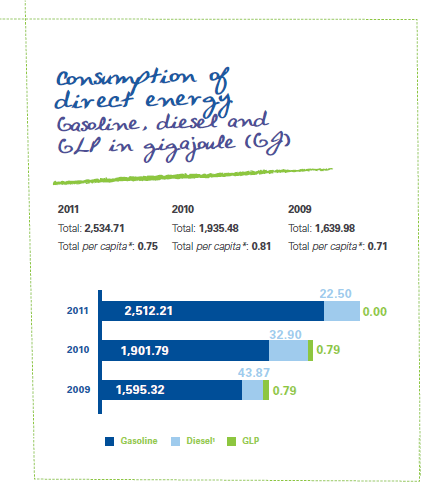
1 Diesel was recalculated in accordance with consumption
considered in scope 1 of the emission inventory.

| Sources of Energy in Brazil in 2011 | |
|---|---|
| Origin | Percentage |
| Non renewal energy | 11.2 |
| Natural gas | 4.6 |
| Petroleum derivatives | 2.5 |
| Nuclear | 2.7 |
| Coal and derivatives1 | 1.4 |
| Renewal energy | 88.8 |
| Hydro | 75.0 |
| Imports2 | 6.7 |
| Biomass3 | 6.5 |
| Wind | 0.5 |
2 Hydro.
3 Include firewood, sugarcane residue, detergents and other recoverable sources
Source: Preliminary Results National Energy Balance Sheet 2012 (BEN).
Consumption of materials
Paper is a significant item in our consumption and also inherent to the business segment. We have innovated our working methodology, contributing towards reducing our consumption of our main supplies. One example is the tool Caseware, an electronic data bank that minimizes the use of physical files, in hard copies. We obtained a similar result with eAudIT, which enables the electronic mapping of audit evidence, such as contracts, proposals and invoices, which has almost eliminated the use of paper.
Laptops comprise another significant and essential material for our activities. Annually, KPMG adapts its equipment and specifically in 2011, this procedure had a greater impact given that almost 1,000 employees joined KPMG throughout Brazil, as a result of the acquisition. The laptops that are obsolete for our activities are categorized based on their possible future use: disposal/return to producer, sale of parts for reuse, donation to community or auction to our professionals.
| Materials used | Unit of measurement | Consumption in 2009 |
Consumption in 2010 |
Consumption in 2011 |
|---|---|---|---|---|
| Sheet paper | Kilos | 63,733 | 82,005 | 74,113 |
| Paper towels | Kilos | 28,835 | 19,342 | 29,409 |
| Plastic cups | Units | 1,306,151 | 1,056,859 | 1,236,775 |
| Media/CD and DVD | Units | 5,970 | 9,324 | 9,854 |
| Toners and cartridges | Units | 459 | 757 | 801 |
| Batteries | Units | 2,129 | 2,057 | 1,255 |
| Pens and pencils | Units | 40,274 | 17,324 | 36,382 |
| Laptops | Units | 362 | 884 | 1,301 |
| PCs | Units | 232 | 59 | 34 |

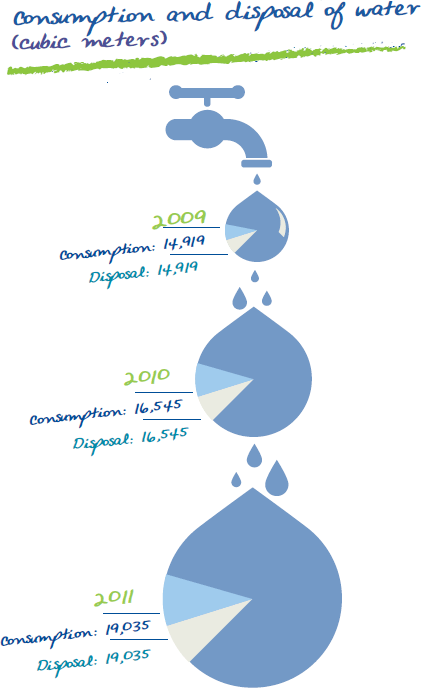
Water consumption
In 2011, we consumed 19,035 cubic meters of water, derived from municipal supply networks. The figures demonstrate an increase compared to the consumption in 2010, which was 16.545 cubic meters, mainly due to the increase in the number of employees and the opening of new offices. KPMG does not reuse or recycle water, and still does not have plans to implant reusing of water. Our wastage is captured by the receptor systems from the public network, in accordance with the environmental legislation applicable to our segment.
In addition to encouraging more responsible use of water, since 2009, our infrastructure area has worked to improve the performance of this indicator, installing equipment to reduce tap leakage in bathrooms, and at the São Paulo offices, a routine has been introduced to water the gardens every other day, and wash the stairs every fortnight.
Goals for 2012-2013
- Implement selective collection in at least
three offices located within condominiums; - Implement the collection of electronic rubbish in São Paulo.
Disposição de resíduos
GRI EN22
Today, in 16 of the KPMG offices, including the four buildings in São Paulo, the paper consumed (our main residue) is recycled – complying with the confidentiality rules – thus avoiding the impact from disposal. The São Paulo offices have also implanted the selective collection of cardboard, plastic, aluminum and glass, which is properly allocated, and is recycled, incinerated or deposited in sanitary landfills by a contracted company.
A specialized company has been contracted to dispose of the diesel consumed by the generators at the offices in São Paulo, At the other KPMG offices generator equipment is not used.
We have sought to improve the management of this process and the relationship with these companies, requesting guarantees for the control over the residues generated and the correct final disposal of such.
With respect to amplifying these policies, we observed more efficient results at the São Paulo offices, which has its own administration, whilst in the other regions, we have to face the challenge of involving the condominiums where the offices are located, to ensure that our residues are being appropriately disposed of.
2 Water consumption at KPMG offices outside of São Paulo is allocated by the condominiums where they are located. To calculation total consumption, we used the average consumption per employee in São Paulo and extrapolated this figure to the Rio de Janeiro office. This same method was used for the other locations based on the number employees at the Goiana office, which is more consistent with the size of the other offices - and always based on the number of employees at each office.
© 2012 KPMG Auditores Independentes, a Brazilian entity and a member firm of the KPMG network of independent member firms affiliated with KPMG International Cooperative (“KPMG International”), a Swiss entity. All rights reserved.
KPMG International Cooperative ("KPMG International") is a Swiss entity. Member firms of the KPMG network of independent firms are affiliated with KPMG International. KPMG International provides no client services. No member firm has any authority to obligate or bind KPMG International or any other member firm vis-à-vis third parties, nor does KPMG International have any such authority to obligate or bind any member firm.
